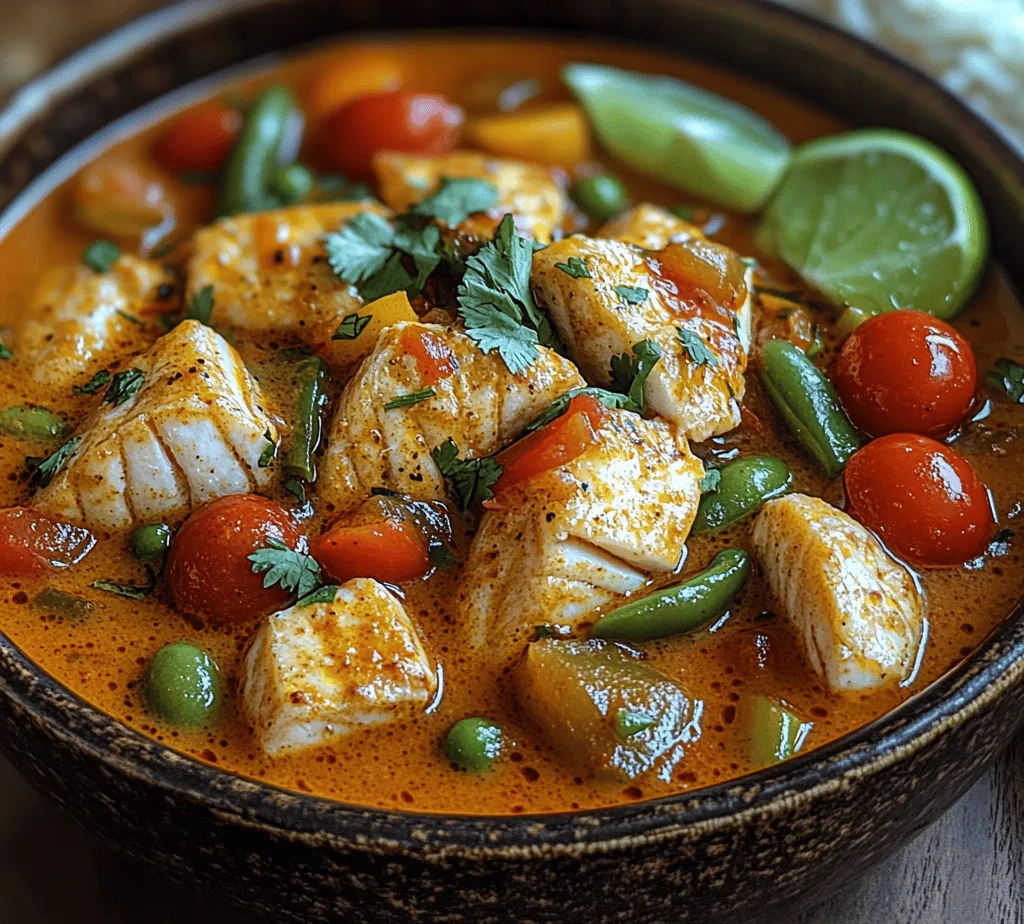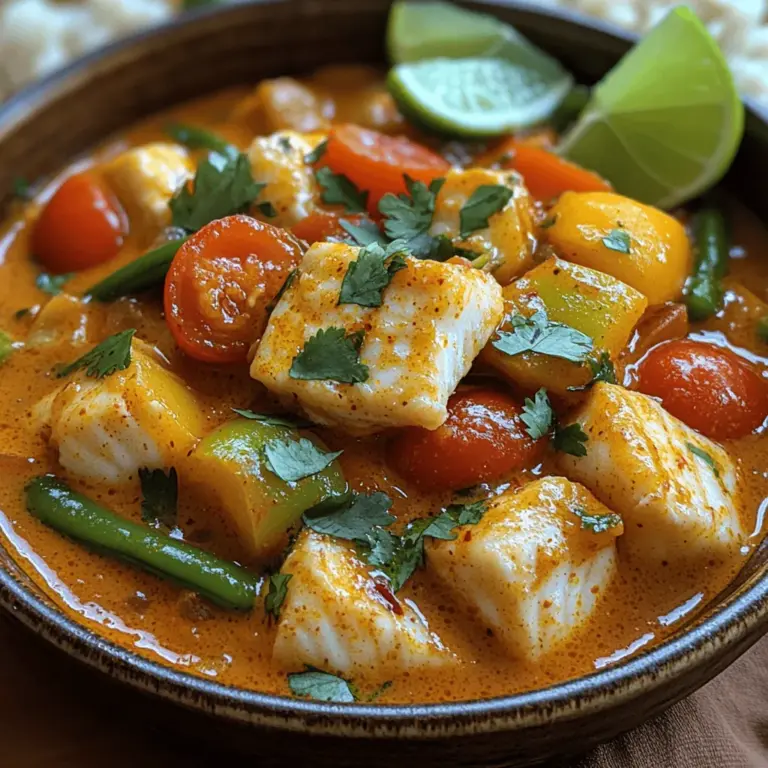Introduction
Thai cuisine is renowned for its vibrant flavors and aromatic dishes that tantalize the taste buds while delivering a sensory experience. At the heart of many Thai recipes lies a perfect harmony of fresh ingredients, bold spices, and a unique balance of flavors. One dish that encapsulates the essence of this culinary tradition is the Thai Curry Coconut Fish Stew. This delightful stew brings together the richness of coconut milk, the warmth of red curry paste, and the freshness of market-fresh fish and vegetables, creating a comforting meal that is both quick and nutritious.
The Thai Curry Coconut Fish Stew is not just a dish; it is a celebration of Thailand’s culinary heritage. It can be prepared in under 30 minutes, making it an ideal weeknight meal for busy individuals and families alike. This stew is not only satisfying to the palate but also nourishing, as it is packed with essential nutrients from the fish and vegetables. Whether you are a seasoned cook or a novice in the kitchen, this recipe is accessible and encourages you to explore the delightful flavors of Thai cooking right in your home.
The Essence of Thai Cuisine
At the core of Thai cooking is the intricate balance of flavors: sweet, sour, salty, and spicy. Each dish is crafted to achieve a delightful equilibrium, making the dining experience both exciting and satisfying. Fresh herbs and aromatic spices play a vital role in this balance. Ingredients such as lemongrass, galangal, and kaffir lime leaves are often used to infuse dishes with a fragrant aroma, while chilies and spices add a kick that leaves a lasting impression.
Coconut milk is a key ingredient that defines many Thai dishes, including our featured stew. Its creamy texture not only adds richness to recipes but also helps to mellow out the heat from spices, providing a perfect backdrop for the bold flavors. Furthermore, coconut milk is known for its health benefits, including healthy fats, vitamins, and minerals that contribute to overall well-being.
The use of fresh and seasonal ingredients is another hallmark of Thai cuisine. Markets brimming with vibrant produce, seafood, and herbs reflect the commitment to using quality ingredients that enhance the flavor and nutrition of each dish. The Thai Curry Coconut Fish Stew exemplifies this principle, as it combines a variety of fresh vegetables, aromatic herbs, and wholesome fish, creating a meal that is as good for the body as it is for the soul.
Ingredients Breakdown
To recreate the enchanting flavors of Thai Curry Coconut Fish Stew, you will need a selection of fresh ingredients that work harmoniously together. Below is a breakdown of the essential components of this recipe.
White Fish Varieties
The choice of fish is crucial for the stew’s success. Opt for firm white fish varieties such as cod, tilapia, or snapper. Each of these fish has a mild flavor that absorbs the aromatic curry and coconut milk beautifully.
– Cod: Known for its flaky texture and mild taste, cod is a popular choice for stews. It is rich in protein and contains essential nutrients like omega-3 fatty acids, which are beneficial for heart health.
– Tilapia: This versatile fish has a delicate flavor and is often favored for its affordability. Tilapia is a great source of protein and is low in calories, making it an excellent choice for a healthy meal.
– Snapper: With its slightly sweet flavor and firm flesh, snapper is a delicious option that holds up well in stews. It is packed with nutrients, including vitamins A and D, and contributes to a well-rounded diet.
Coconut Milk
Coconut milk is one of the standout ingredients in this recipe, providing a creamy and luscious texture that enhances the overall experience of the dish. In Thai cuisine, coconut milk is used not only for its flavor but also for its nutritional properties. It contains medium-chain triglycerides (MCTs), which are known to support energy levels and promote heart health.
When selecting coconut milk, look for a high-quality product without additives or preservatives, as this will ensure the best flavor and health benefits for your stew.
Red Curry Paste
Red curry paste is the heart and soul of this dish, infusing it with a complex flavor profile. Typically made from a combination of red chilies, garlic, lemongrass, galangal, shallots, and spices, red curry paste adds depth and warmth to the stew.
The spiciness of the paste can vary based on the brand and the amount used, so feel free to adjust according to your taste preferences. The paste not only enhances the flavor but also imparts a beautiful, vibrant color to the dish.
Vegetables
A medley of fresh vegetables adds both flavor and nutrition to the Thai Curry Coconut Fish Stew. For this recipe, we will be using:
– Cherry Tomatoes: These bite-sized tomatoes add a burst of sweetness and acidity, balancing the richness of the coconut milk.
– Bell Peppers: Colorful bell peppers contribute crunch and sweetness, while also providing a range of vitamins and antioxidants.
– Green Beans: These provide a satisfying snap and a vibrant green color, along with dietary fiber and essential nutrients.
Aromatics
To build a robust flavor base for the stew, we will incorporate aromatics such as onion, garlic, and ginger.
– Onion: A staple in many cuisines, onions provide a savory foundation for the stew. They caramelize beautifully, enhancing the overall flavor profile.
– Garlic: Known for its aromatic qualities, garlic not only adds depth to the dish but also offers numerous health benefits, including immune support and anti-inflammatory properties.
– Ginger: With its warm, spicy flavor, ginger elevates the dish and adds a unique zing. It is also celebrated for its digestive benefits and anti-inflammatory effects.
Seasonings
To round off the flavors of the Thai Curry Coconut Fish Stew, we will be using a few key seasonings:
– Fish Sauce: This fermented condiment is a staple in Thai cuisine, imparting a salty and umami-rich flavor that enhances the stew’s overall taste.
– Brown Sugar: A touch of brown sugar balances the spices and acidity, creating a well-rounded flavor profile that is characteristic of Thai dishes.
– Lime Juice: Fresh lime juice adds a bright, zesty element that elevates the flavors and provides a refreshing finish to the stew.
Step-by-Step Cooking Instructions
Now that you have gathered all the essential ingredients, it’s time to embark on the delightful journey of preparing the Thai Curry Coconut Fish Stew. Let’s break down the cooking process step-by-step to ensure clarity and ease for your culinary adventure.
Sautéing the Aromatics
The first step in creating a flavorful stew is to sauté the aromatics. Begin by heating a tablespoon of oil in a large pot or Dutch oven over medium heat.
1. Add the chopped onion: Once the oil is shimmering, add the chopped onion to the pot. Sauté for about 3-4 minutes until the onions become translucent and fragrant. This initial cooking stage is vital as it develops the flavor base of the stew.
2. Incorporate garlic and ginger: Next, stir in minced garlic and grated ginger. Continue to sauté for another 1-2 minutes, allowing the garlic and ginger to release their aromatic compounds. Be sure to keep an eye on the mixture to prevent burning; it should become fragrant but not browned.
3. Visual cues: Look for the onions to become soft and translucent, and the garlic and ginger to become aromatic. This indicates that the aromatics are ready for the next step.
This sautéing process is essential, as it builds the depth of flavor that will permeate the stew. Once the aromatics are perfectly cooked, you will be ready to add the remaining ingredients and continue crafting this delicious Thai Curry Coconut Fish Stew.

Incorporating the Curry Paste
To unlock the full flavor potential of your Thai Curry Coconut Fish Stew, it’s crucial to properly incorporate the curry paste. Start by heating a tablespoon of coconut oil in a large pot over medium heat. Once the oil is hot, add the curry paste, stirring it continuously for about 2 to 3 minutes. This process, known as “blooming,” intensifies the flavors by releasing the aromatic oils contained within the spices. The paste should become fragrant and slightly darker in color, indicating that the essential oils are being activated. This step lays the foundation for the rich, complex flavors that will permeate your stew.
Combining Coconut Milk and Broth
When it’s time to combine the coconut milk and vegetable broth, it’s essential to strike a balance between the creamy richness of the coconut milk and the light, refreshing qualities of the vegetable broth. Gradually pour in one can of full-fat coconut milk while stirring, followed by 2 cups of vegetable broth. This combination not only creates a luscious, velvety base but also keeps the stew from becoming overly heavy. The coconut milk provides a hint of sweetness, while the broth adds depth and balance, resulting in a stew that is both comforting and invigorating.
Seasoning the Stew
Seasoning is key to achieving a well-rounded flavor profile in your Thai Curry Coconut Fish Stew. After combining the coconut milk and broth, bring the mixture to a gentle simmer. Taste the stew and adjust the seasoning as needed. You may want to add a splash of soy sauce for umami, a squeeze of lime juice for acidity, or a pinch of sugar to balance the flavors. Remember, the goal is to enhance the natural ingredients without overpowering them. Don’t rush this step; continually tasting and adjusting ensures that the final dish is tailored to your preferences.
Adding Fresh Vegetables
Fresh vegetables not only contribute to the nutritional value of your stew but also provide an appealing crunch and a burst of color. To maintain their vibrant hues and crisp textures, add them at the right time. Common choices for this stew include bell peppers, snap peas, and zucchini. Cut them into bite-sized pieces and add them to the pot after the coconut milk and broth have simmered for about 10 minutes. This will allow the vegetables to cook through without becoming mushy. Stir gently to ensure even cooking, and monitor them closely to keep their colors bright and appealing.
Cooking the Fish
Cooking the fish perfectly is essential to achieving a delicious Thai Curry Coconut Fish Stew. Choose firm white fish varieties like cod, halibut, or tilapia, as they hold up well during cooking. Cut the fish into large chunks, about 1-2 inches in size, which will allow for even cooking. Add the fish to the pot once the vegetables are al dente, and simmer gently for about 5-7 minutes. Avoid high heat and vigorous boiling, as this can lead to tough, rubbery fish. You’ll know the fish is done when it flakes easily with a fork and is opaque throughout.
Final Touches
No Thai Curry Coconut Fish Stew is complete without fresh garnishes that elevate the dish. Just before serving, sprinkle a generous handful of chopped fresh cilantro over the stew; its bright flavor complements the rich coconut base beautifully. Additionally, serve with lime wedges on the side, allowing diners to squeeze fresh lime juice over their bowls just before eating. This final touch adds a zesty brightness that cuts through the richness, making each bite even more satisfying.
Serving Suggestions
When it comes to serving your Thai Curry Coconut Fish Stew, there are several delicious accompaniments that can enhance the experience. Jasmine rice is a classic pairing, as its fragrant aroma and soft texture soak up the flavorful broth. Alternatively, you can serve the stew over rice noodles for a delightful twist, or with crusty bread to dip into the coconut-infused sauce.
For an attractive presentation, consider plating the stew in wide, shallow bowls. Ladle the stew into each bowl, ensuring a generous portion of fish and vegetables. Top it off with fresh cilantro and lime wedges for a pop of color and freshness. This not only makes the dish visually appealing but also invites your guests to personalize their servings.
Nutritional Benefits of Thai Curry Coconut Fish Stew
The ingredients in your Thai Curry Coconut Fish Stew come together to create a nutritious meal that is both satisfying and healthy. Fish is an excellent source of high-quality protein and omega-3 fatty acids, which are beneficial for heart health. The inclusion of vibrant vegetables adds a wealth of vitamins and minerals, such as vitamin C from bell peppers and fiber from zucchini.
Coconut milk, while creamy and rich, also provides healthy fats that can promote a feeling of fullness. It contains medium-chain triglycerides (MCTs), which may support weight management and provide quick energy. Overall, this stew is a balanced meal that offers protein, healthy fats, and a variety of vitamins, making it an excellent choice for a wholesome family dinner.
Cultural Significance of Thai Fish Stews
Fish stews hold a prominent place in Thai cuisine, reflecting the country’s rich culinary heritage. Coastal regions, where fishing is a primary livelihood, have developed a variety of fish-based dishes that showcase the freshness and flavor of local catch. Ingredients like coconut milk, lemongrass, and chili are staples in Thai cooking, and they come together in this stew to create a dish that is both deeply rooted in tradition and widely loved.
This stew also embodies the Thai philosophy of balancing flavors—sweet, sour, salty, and spicy—creating a harmonious dish that delights the palate. Each region of Thailand offers its own variations, with local ingredients and cooking methods influencing the flavor profile. By preparing this dish at home, you’re not just enjoying a meal; you’re also participating in a cultural exchange that celebrates the essence of Thai culinary traditions.
Conclusion
In summary, the Thai Curry Coconut Fish Stew is a vibrant, nutritious dish that encapsulates the essence of Thai cuisine. From the rich, aromatic curry paste to the flaky fish and colorful vegetables, every component contributes to a delightful culinary experience. This recipe is not only easy to prepare but also offers a wonderful opportunity to share the flavors of Thailand with family and friends.
Cooking this stew is a joyful experience that invites creativity and personalization, allowing you to adjust the ingredients and seasonings to suit your taste. Whether served on a weeknight or during a special gathering, this dish is sure to impress and satisfy. So gather your ingredients, embrace the cooking process, and savor the delightful flavors of your homemade Thai Curry Coconut Fish Stew.

